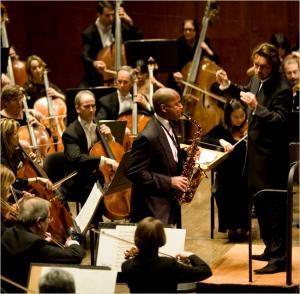 Coltrane’s A Love Supreme: Live in Amsterdam reissue from the Branford Marsalis Quartet out now and available on vinyl for the very first time Read more »
Coltrane’s A Love Supreme: Live in Amsterdam reissue from the Branford Marsalis Quartet out now and available on vinyl for the very first time Read more »
Pratfalls From Haydn, Swing From Marsalis
Publication: New York Times
Author: Steve Smith
Date: February 18, 2011
Taken at face value, the program that the New York Philharmonic presented on Wednesday evening in Avery Fisher Hall was a curious clutch of disparate works. Still, there was symmetry to the arrangement: two saxophone showcases played with an estimable soloist, Branford Marsalis, both also heard during a Philharmonic concert in Central Park last summer, flanked here by pieces that repurposed viable music from forgotten stage dramas.
There were lessons to be learned from the event. One, obviously, was that any good music can survive the specifics of its provenance.
Another was that the Philharmonic remains a potent entity even at a fraction of its standard fighting weight, since these pieces all used reduced forces. A third was that the conductor Andrey Boreyko, who had his debut with the Philharmonic in December 2007 and led the Central Park concert with Mr. Marsalis, is fluent in a variety of styles well beyond the Russian fare that served as his initial calling card.
In Haydn’s Symphony No. 60 (“Il Distratto,” or “The Absent-Minded Man”), the curtain raiser, the orchestra sounded trim and lithe if not overly bothered by current notions of period style. Haydn packed the symphony’s six movements, first fashioned as incidental music for a courtly entertainment, with jokes and pratfalls: inattentive fritters and jolts in the opening Allegro; robust brass interruptions in the Andante; an awkward retuning by the violins in the Finale. Mr. Boreyko contributed to that last bit of shtick with stagy shrugs and gestures of impatience.
No such physical gags applied in Strauss’s suite from the comédie-ballet “Le Bourgeois Gentilhomme,” which closed the concert. But the sly wit in Strauss’s admiring evocations of Jean-Baptiste Lully, and winking references to Wagner and his own earlier works, was equally telling. So was the refulgent surge Mr. Boreyko and the players brought to their account.
Mr. Marsalis brought a gracious poise and supple tone to Glazunov’s Concerto for Alto Saxophone and String Orchestra, and an insouciant swagger to Erwin Schulhoff’s “Jazz Concerto,” Richard Rodney Bennett’s arrangement for winds, brass, double basses and percussion of Schulhoff’s “Hot-Sonate” for alto saxophone and piano.
Glazunov, evidently, was untouched by jazz, though you could not unhear the instrument’s associations. The Schulhoff work, appealingly jazzy in an arch mode like Kurt Weill’s, was stiffened by percussion writing too labored to breathe. When David Ratajczak, the percussionist, was freed to swing for real with Mr. Marsalis and a bassist, David J. Grossman, in a shuffling, improvised encore of Weill’s “Mack the Knife,” the difference in feel could hardly have been more apparent.
Categories
Tags in Tags
Branford Marsalis Branford Marsalis Quartet ellis marsalis four mfs playin' tunes Joey Calderazzo Justin Faulkner Marsalis Family marsalis music metamorphosen miguel zenon music redeems new orleansFilter by Artist
Marsalis Music Radio
Join Our Mailing List
- RT @bmarsalis: Compliments of the @T_Blanchard archives. https://t.co/4RsXbyEloa — 3 years 18 weeks ago MarsalisMusic